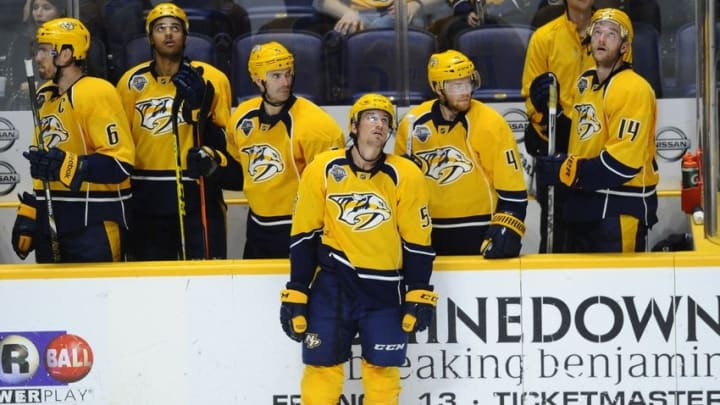The Nashville Predators have not been good at 3 on 3 overtimes this season.
3 on 3 NHL overtime is simply not hockey. The NHL is rewarding teams that beef-up with forwards while simultaneously punishing teams that spend on defense first.
More from Predlines
- Nashville Predators Need to Show Progress after Doubleheader Preseason Losses
- How the Nashville Predators Should Fill Out Their Bottom Six
- Nashville Predators: Where Kevin Lankinen Ranks Among Backup Goalies
- Nashville Predators vs. Florida Panthers: Top 3 Impact Players to Watch
- Speed is the Theme Early on at Nashville Predators Training Camp
Before I begin, let me be clear that my displeasure with the NHL overtime rules has nothing to do with the Predators abysmal record in the extra frame. Which is honestly laughable at this point. Watching the Nashville Predators in overtime is like popping in a DVD labeled Train Crashes 6. You’re not sure when the train is going to crash and burn, nevertheless you know it’s coming. But I digress…
The 2015-2016 NHL season brought the beginning of a new overtime format. As shown in this CBS Sports article, GM’s were displeased, with the amount of tied games being decided in a shootout and chose to go with 3 on 3. The idea of decreasing shootouts seems to have been successful, but does that make the game better?

I agree that the new overtime is exciting, but it is simply not hockey. Neither are shootouts, our other tiebreaker, but that’s an argument for another day.
One may counter my statement with: “Why does it matter how many people are on the ice? As long as there’s skates, sticks, and pucks it’s hockey”.
Let’s use baseball as an example. If the MLB decided to remove the outfielders in extra innings in the interest of “speeding up the game”, baseball fans would riot.
Every baseline hit would turn into a double at the very least.
Heck lets move the outfield in 100 feet. Imagine how many home runs there would be! Sure, runs would go up but is that really fun? 3 on 3 overtime in hockey is no different.
Furthermore, it punishes teams that lack superstars up-front. If we compare the rosters of some of the best and worst OT teams in the NHL, the impact of offensive “star power” is obvious.
Overtime records and offensive stars:
LA-11-3, Kopitar, Gaborik, Carter,
Cgy-9-3, Gaudreau
Phi-9-5, Giroux, Voracek
Chi-9-5, Kane, Toews, Hossa
Nsh-1-12 Johansen*, Neal, Forsberg
Min-1-9 Parise
Fla- 1-6 Jagr, Barkov
Tor- 1-5 Kadri?
Johansen was traded Jan 6, 2016. Predators 0-6 in OT since the trade.
The Preds are clearly the outlier which makes their record all the more frustrating.
I scratched out the ageless wonder Jaromir Jagr because his foot-speed is not what it once was. Jagr is not at his best in a 3 on 3 setting.

While Johnny Gaudreau is the only player I would consider an offensive star on the Flames, he is tailor-made for this format. “Johnny-Hockey” has 8 points in 9 of Calgary’s OT victories.
I understand the NHL’s reasoning behind having an overtime to promote their offensive stars. A forward dangling through 2 defenders and picking a corner makes Top 10 lists on every network. Conversely, Shea Weber poke-checking a winger in the neutral zone barely gets a live play-by-play mention.
Manipulating the game to produce highlights is a travesty. Using a 3 on 3 skills competition to break ties is simply unfair to defensive minded teams. Will the Predators have better luck next year in overtime? The law of averages says yes, but I take little solace in that.
The NHL is the only league of the four major professional leagues to fundamentally change the game in extra time. 3 on 3 is just as goofy as a free-throw competition to decide a basketball game. The NHL needs to get over the fact that fans think ties are boring.
Next: Possible Playoff Preview
Teams like Nashville, Minnesota, and Florida will have their post-season positioning altered drastically due to failing arbitrary skills competitions. While ties may be boring, as a fan, I would rather have an even playing field.
